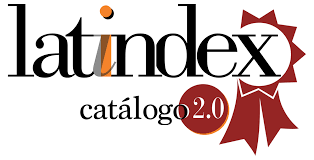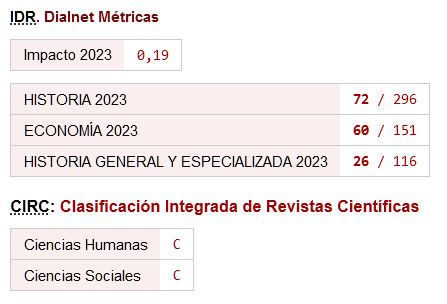The earlier synthetic balance sheet of Datini's Company in Avignon (1410)
The combined accounting system
DOI:
https://doi.org/10.26784/issn.1886-1881.v17i1.371Palabras clave:
stocktaking and assessment, Double entry, Quaderno di Ragionamento, Synthetic Balance SheetResumen
When studying accounting history, the use of archival sources is very important. Unfortunately, when scholars explore the genesis of accounting practice, archival sources are not often used. This paper does so, presenting a detailed explanation of features of the accounting system used by Francesco di Marco Datini’s’ company in Avignon 14091410. This accounting system used stocktaking and double entry in order to determination of the operating result and produce an analytical balance sheet. This study analyzed the Quaderno di Ragionamento (the book for drawing-up final accounts, including the financial result) with the aim of clarifying the features of this process. It also investigated the procedure used in preparing the synthetic balance sheet, a process not known previously elsewhere. This research was based on the archival material comprising of account books of the medieval merchant company of Datini, preserved in the State Archive in Prato.
Descargas
Citas
Aleinikov, D., M. Kuter, and A. Musaelyan. (2018) "The Early Cash Account Books". In: Antipova T., Rocha Á. (eds) Information Technology Science. MOSITS 2017. Advances in Intelligent Systems and Computing, vol 724. Springer, Cham https://doi.org/10.1007/978-3-319-74980-8_18
Antonelli, V., and M. Sargiacomo. (2015). "Alberto Ceccherelli (1885-1958): Pioneer in the history of accounting practice and leader in international dissemination", Accounting History Review 25 (2): 121-44. https://doi.org/10.1080/21552851.2015.1046890
Bellini, C. (1883) La logismografia e le sue forme, ovvero la teorica delle scritture secondo il metodo razionale (The logismography and its forms, or accounting theory on a rational basis), Reggio Emilia: Stab. Tipografia Artigianelli.
Bensa, E. (1923). Francesco di Marco Datini : discorso detto nell'Aula maggiore del Comune di Prato il dì 21 agosto 1910. - Genova, ARTI GRAFICHE CAIMO & C.
Bensa, E. (1925). Le forme primitive della polizza di carico: ricerche storiche con documenti inediti / Enrico Bensa. - Genova: Caimo.
Bensa, E. (1928). Francesco di Marco da Prato. Notizie, e documenti sulla mercatura italiana del secolo XIV, Treves, Milano.
Besta, F. (1909). La Ragioneria, 2nd Edition (In 3 Volumes), Facsimile Reprint, 2007, Rome: Rirea.
Braudel, F. (1982) Histoire iconomique et sociale dr la France, Tome 4, Vol. 3, Paris: Presses Universitaires de France.
Brown, J (2012) "Evidence for early Tuscanisation in the commercial letters from the Milanese merchant Giovannino da Dugnano (?-1398) in the Datini Archive in Prato". Italica 89: 464-88
Carrère, C. (1978). Structures et evolution des entreprises pre-industrielles: le cas de Barcelone au bas Moyen Age, in Studi in memoria di Federigo Melis, Vol. 3, Napoli.
Ceccherelli, A. (1913). I libri di mercatura della Banca Medici e l'applicazione della partita doppia a Firenze nel secolo decimoquarto. Firenze: Bemporad.
Ceccherelli, A. (1914а). "Le funzioni contabili e giuridiche del bilancio delle società medievali." Rivista Italiana di Ragioneria 14 (8): 371-78.
Ceccherelli, A. (1914b). "Le funzioni contabili e giuridiche del bilancio delle società medievali (Continuazione e fine)." Rivista Italiana di Ragioneria 14 (10): 436-44.
Ceccherelli, A. (1939). l linguaggio dei bilanci. Formazione e interpretazione dei bilanci commerciali. Firenze: Le Monnier.
Cecchi, A.E. (2004) L'Archivio di Francesco di Marco Datini. Fondaco di Avignone. Inventario, Roma 2004
Corsani G. (1922) I fondaci e i banchi di un mercante pratese del Trecento. Contributo alla storia della ragioneria e del commercio. Da lettere e documenti inediti, La Tipografica, Prato.
De Roover, R. (1937) "Aux origines d'une technique intellectuelle: La formation et expansion de la comptabilite ́ a' partie double". Annales D'Histoire Economique Et Sociale 9: 171-193, 270-298.
De Roover, R. (1955). "New Perspectives on the History of Accounting", The Accounting Review. Vol. 30 (3), pp. 405-20.
De Roover, R. (1956). The development of accounting prior to Luca Pacioli according to the account-books of Medieval merchants / R. de. Roover // Littleton А.С., Yamey B.S. Studies in the History of Accounting. London: 114-74.
Goldthwaite, R. (1968). Private Wealth in Renaissance Florence. Princeton: Princeton University Press. https://doi.org/10.1515/9781400878628
Del Lungo, I. (1897), Francesco di Marco Datini mercante e benefattore, Giaclietti, Prato.
Gurevich, A.J. (1990) The merchant, in: J. le Goff (Ed.) The Medieval World. London: Collins & Brown.
Hoskin, K. and R. Macve (1986). "Accounting and the examination: a genealogy of disciplinary power", Accounting, Organizations and Society, 11(2): 105-36. https://doi.org/10.1016/0361-3682(86)90027-9
Hyde, J, (1979). "Some Uses of Literacy in Venice and Florence in the Thirteenth and Fourteenth Centuries", Transactions of the Royal Historical Society. London, Vol. 29, 109-128. https://doi.org/10.2307/3679115
Pierre, J. (1996) "Three medieval merchants: Francesco di Marco Datini, Jacques Coeur and Benedetto Cotrugli", Accounting, Business & Financial History, 6:3, 261-75, https://doi.org/10.1080/09585209600000046
Kuter, M, M. Gurskaya, A. Andreenkova and R. Bagdasaryan (2017) "The early practices of financial statements formation in Medieval Italy", The Accounting Historians Journal, Vol. 44(2), 1725. https://doi.org/10.2308/aahj-10543
Kuter, M, M. Gurskaya, A. Andreenkova and R. Bagdasaryan (2018a) "Asset impairment and depreciation before the 15th century", The Accounting Historians Journal, Vol. 45(1), 2944. https://doi.org/10.2308/aahj-10575
Kuter, M. and Gurskaya, M. (2018b) The unity of the early practices of financial result formation: the cases of Alberti's, Datini's, and Savary's works (1675) Théorie comptable et sciences économiques du xve au xxie siècle: Mélanges en l'honneur du Professeur Jean-Guy Degos, edited by Y. Levant S. Trébucq, 109120 Paris, FranceL'Harmattan. 14578. https://doi.org/10.3917/har.levan.2018.01.0145
Kuter, M., A. Sangster, and M. Gurskaya (2019) "The formation and use of a profit reserve at the end of the fourteenth century", Accounting History: https://doi.org/10.1177/1032373219870316
Kuter, M, M. Gurskaya and R. Bagdasaryan (2019b). "The correction of double entry bookkeeping errors in the late 14th century", CONTABILITÀ E CULTURA AZIENDALE, vol. XIX, Issue 1, 730. https://doi.org/10.3280/CCA2019-001002
Kuter, M, M. Gurskaya and A. Papakhchian (2019c) "The Early Practice of Maritime Insurance Accounting in the First Proprietorship of Francesco di Marco Datini in Pisa in 1382-1406", Digital Science 2019, AISC 1114, Chapter https://doi.org/10.1007/978-3-030-37737-3_27
Livi, G. (1910) Dall'Archivio di Francesco Datini mercante pratese, F. Lumachi, Firenze.
Macve, R. (1985) "Some glosses on "Greek and Roman accounting", History of Political Thought, 6.1/2, 23364.
Martinelli, A. (1974) The Origination and evolution of double entry bookkeeping to 1440. ProQuest Dissertations & Theses Global pg. n/a.
Melis, F. (1950) Storia della Ragioneria (Bologna: Cesare Zuffi, 1950), 872 p.
Melis, F. (1954) L'archivio di un mercante e banchiere trecentesco: Francesco di Marco Datini da Prato, in "Moneta e Credito", VII.
Melis, F. (1962) Aspetti della vita economica medievale (studi nell'archivio Datini di Prato), Siena: Monte dei Paschi di Siena.
Melis, F. (1972) Documenti per la storia economica dei secoli XIII-XVI, Leo S. Olschki, Firenze, 752 p.
Moshenskyi, Sergii (2008) History of the Weksel. Xlibris Corporation.
Nanni, P (2010) Ragionare tra mercanti: Linguaggio e concezioni nelle relazioni di Francesco Datini (1335ca-1410). Pisa: Pacini.
Nicastro, S. (1914) L'Archivio di Francesco di Francesco di Marco Datini in Prato, Rocca S. Casciano, L. Cappelli.
Nigro, G. (2013) Fondo Archivistico Federigo Melis. Inventario analitico. Vol. 2. Prato: Fondazione Istituto Internazionale di Storia Economica "F. Datini"
Nigro, G. (2010) Francesco di Marco Datini. The man, the merchant. Firenze: Florence University Press. https://doi.org/10.36253/978-88-8453-642-6
Origo, I. (1957) The Merchant of Prato, Francesco di Marco Datini, London, J. Cape.
Orlandi, A (2014) Networks and commercial penetration models in the late medieval Mediterranean: Revisiting the Datini. In: Caracausi A e Jeggle C (a cura di) Commercial Networks and European Cities, 1400-1800. London: Pickering and Chatto, pp. 81-106.
Sargiacomo, M., S. Servalli, and P. Andrei. (2012) "Fabio Besta: Accounting Thinker and Accounting History Pioneer", Accounting History Review 22 (3), 249-67. https://doi.org/10.1080/21552851.2012.728904
Sangster, A. (2015). "The genesis of double entry bookkeeping". The Accounting Review, 91(1), 299-315. https://doi.org/10.2308/accr-51115
Sapori, A. (1952) Le Marchand Italien au Moyen Age, Paris: Librarie Armand Colin.
Yamey, B.S. (2005) "The historical significance of double-entry bookkeeping: Some non-Sombartian claims", Accounting, Business & Financial History, 15:1, 7788, https://doi.org/10.1080/09585200500033089
Zerbi, T. Il Mastro a Partita Doppia di. Un' Azienda Mercantile del Trecento, Como: E. Cavalieri, 1936.
Zerbi, T. (1952) Le Origini della partita dopia: Gestioni aziendali e situazioni di mercato nei secoli XIV e XV (Milan: Marzorati).
Descargas
Publicado
Cómo citar
Número
Sección
Licencia

Esta obra está bajo una licencia internacional Creative Commons Atribución-NoComercial-CompartirIgual 4.0.










